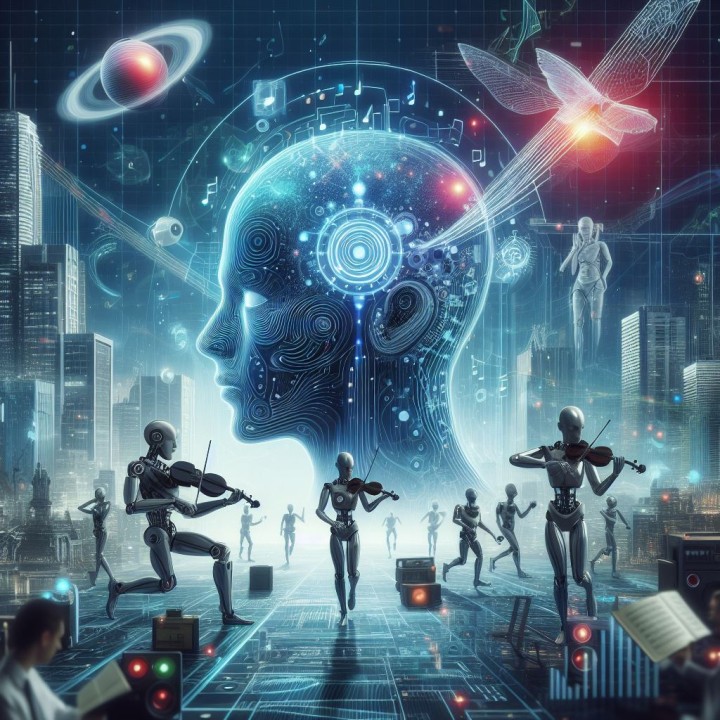Artificial Intelligence (AI) is no longer a futuristic concept—it’s a driving force that is reshaping every aspect of our lives, industries, and economies. From self-driving cars to predictive algorithms in healthcare, AI has already proven its potential to revolutionize multiple fields. This article explores the applications, benefits, challenges, and ethical considerations surrounding AI as it becomes an integral part of our daily lives.
1. What is Artificial Intelligence?
Artificial Intelligence refers to the development of computer systems that can perform tasks typically requiring human intelligence, such as visual perception, speech recognition, decision-making, and language translation. AI is achieved through complex algorithms and machine learning models that allow machines to learn from data and make decisions without human intervention.
Subfields of AI:
-
Machine Learning (ML): A method that enables machines to learn patterns and make predictions based on data. ML systems continuously improve their performance over time.
-
Deep Learning (DL): A subset of ML that uses neural networks to simulate the human brain’s processing. Deep learning is responsible for tasks like image recognition and natural language processing (NLP).
-
Natural Language Processing (NLP): This allows machines to understand, interpret, and generate human language, enabling applications like chatbots, translation, and voice assistants.
-
Robotics: AI-driven robots are used in industries like manufacturing, healthcare, and logistics for automation and precision tasks.
2. AI in Healthcare: Transforming Diagnosis, Treatment, and Patient Care
The healthcare industry has seen some of the most promising applications of AI. With AI, the precision of medical practices has reached new heights, and patient outcomes have the potential to improve significantly.
-
Early Detection and Diagnosis: AI models can analyze medical images like CT scans, X-rays, and MRIs to detect abnormalities such as tumors, fractures, or signs of disease. AI systems often perform these tasks faster and with greater accuracy than human doctors. For example, algorithms like Google’s DeepMind have been trained to detect diabetic retinopathy and eye diseases with higher accuracy than traditional methods.
-
Personalized Treatment Plans: AI can analyze vast amounts of patient data, including medical records, genetic information, and lifestyle factors, to create customized treatment plans. This ensures that patients receive the most effective care based on their individual needs.
-
Drug Discovery: The drug development process is traditionally lengthy and expensive. AI accelerates this by predicting how chemical compounds interact with each other and whether they could be effective treatments for specific diseases. AI systems have been instrumental in discovering new drug candidates for diseases like cancer and Alzheimer’s.
-
Robotics in Surgery: AI-powered robots assist surgeons in performing delicate operations with enhanced precision. These robots can perform minimally invasive surgeries, leading to quicker recovery times and fewer complications.
3. AI in Business: Enhancing Efficiency and Personalization
In business, AI has become an invaluable tool for driving efficiency, enhancing decision-making, and personalizing customer experiences.
-
Predictive Analytics: AI enables businesses to analyze historical data and make data-driven predictions about customer behavior, market trends, and operational challenges. For instance, AI models help companies predict demand, optimize pricing strategies, and manage inventories effectively.
-
Personalized Customer Experiences: AI-driven tools allow businesses to offer personalized services and products. Companies like Amazon use machine learning algorithms to recommend products based on previous purchases and browsing history, providing a more tailored shopping experience.
-
Automation of Routine Tasks: AI is increasingly being used to automate repetitive tasks such as data entry, payroll management, and customer support. This reduces the burden on human workers and frees up time for higher-value tasks. For example, AI-powered chatbots handle customer queries 24/7, improving response times and satisfaction.
-
AI in Marketing: With AI, marketing strategies are becoming more efficient and targeted. Machine learning algorithms can analyze vast amounts of consumer data to segment audiences and create more personalized advertising campaigns. This leads to improved engagement and higher conversion rates.
4. AI in Transportation: The Future of Mobility
AI is set to revolutionize transportation, from autonomous vehicles to smart traffic management systems. These innovations aim to enhance safety, reduce traffic congestion, and create more sustainable transportation systems.
-
Autonomous Vehicles: Self-driving cars use a combination of sensors, cameras, and AI algorithms to navigate roads, detect obstacles, and make real-time decisions. Companies like Tesla, Waymo, and Uber are investing heavily in autonomous vehicle technology. These vehicles have the potential to reduce accidents caused by human error, decrease traffic congestion, and lower carbon emissions.
-
Traffic Optimization: AI-powered systems can monitor traffic patterns in real-time, adjusting traffic lights and signals to optimize flow and reduce congestion. These systems can predict traffic jams, suggest alternative routes to drivers, and even direct autonomous vehicles to avoid bottlenecks.
-
Smart Public Transport: AI is being integrated into public transportation systems to improve scheduling, routing, and efficiency. For example, AI can predict when buses or trains will be crowded and adjust schedules or vehicle capacity accordingly to meet demand.
5. AI in Finance: Revolutionizing Banking, Investing, and Risk Management
In the financial sector, AI is improving everything from customer service to fraud detection and risk management.
-
Fraud Detection and Prevention: AI is used to detect fraudulent transactions by analyzing patterns in financial data. Machine learning algorithms are trained to identify unusual behavior or anomalies in transactions, such as multiple withdrawals from different locations, which could indicate fraud. Banks and credit card companies use AI to stop fraudulent activities before they occur.
-
Algorithmic Trading: AI-driven systems are used by hedge funds, investment banks, and retail investors for algorithmic trading. These systems can analyze market data in real-time and execute trades faster than human traders. AI can also predict market trends and adjust investment portfolios to maximize returns.
-
Customer Service Automation: Many banks now use AI-powered chatbots to handle customer queries, such as balance inquiries, loan information, and payment processing. These bots provide instant responses and improve customer satisfaction.
6. AI in Education: Personalized Learning and Administrative Efficiency
AI has the potential to transform the education system, providing personalized learning experiences for students and streamlining administrative tasks for educators.
-
Adaptive Learning Systems: AI-based learning platforms can assess a student’s strengths, weaknesses, and learning pace. Based on this data, the system delivers personalized lessons and resources, ensuring that students learn at their own pace and receive content suited to their needs.
-
Intelligent Tutoring Systems: AI-powered tutoring systems provide students with real-time feedback and guidance. These systems can answer questions, explain concepts, and provide additional resources to help students master difficult subjects.
-
Automating Administrative Tasks: AI is also used to automate administrative duties, such as grading assignments and scheduling classes. This reduces the administrative burden on teachers and allows them to focus on teaching.
7. AI in Entertainment: Shaping the Future of Content Creation
The entertainment industry is leveraging AI to enhance content creation, distribution, and personalization.
-
AI in Content Creation: AI is used to generate content such as music, art, and even movie scripts. For example, AI algorithms can analyze popular trends and create music compositions or visual art based on those trends. In film, AI is used for generating special effects and improving visual quality.
-
Recommendation Systems: Streaming platforms like Netflix, Spotify, and YouTube use AI to recommend personalized content based on users’ preferences, viewing history, and listening habits. These algorithms continually learn and adapt to provide more accurate recommendations.
8. Ethical Considerations and Challenges of AI
While AI presents numerous opportunities, it also raises important ethical and societal concerns.
-
Bias in AI Algorithms: AI systems can inherit biases present in the data they are trained on. For example, if an AI system is trained on biased hiring data, it could perpetuate discrimination in recruitment. It is crucial for developers to ensure that AI systems are trained on diverse, representative datasets to minimize bias.
-
Privacy and Data Security: AI systems require vast amounts of personal data to function effectively. Protecting this data from breaches and misuse is critical. Governments and organizations must implement strong data protection regulations and privacy policies.
-
Job Displacement: As AI automates more tasks, there is concern over the displacement of workers. Industries like manufacturing, retail, and customer service are especially vulnerable to automation. It is essential for policymakers to focus on retraining and reskilling workers to adapt to the changing job market.
-
Autonomy and Accountability: The rise of autonomous systems, such as self-driving cars and AI-powered drones, raises questions about accountability in the event of an accident or malfunction. Who is responsible when an AI system makes a mistake? Legal frameworks need to be established to address these challenges.
Conclusion: AI’s Transformative Potential and Our Future
Artificial Intelligence is no longer just a buzzword; it’s a transformative force that is shaping the future of industries, economies, and societies. While AI brings incredible opportunities for improving healthcare, enhancing business operations, and revolutionizing transportation, it also requires careful consideration of ethical issues and societal implications.
As AI continues to evolve, it is essential for technologists, policymakers, and the public to work together to ensure that AI is developed and used responsibly. By fostering innovation and addressing ethical challenges, we can harness AI’s potential to create a more efficient, equitable, and sustainable future for all.

